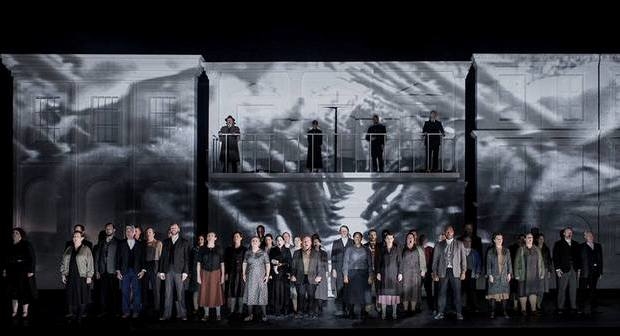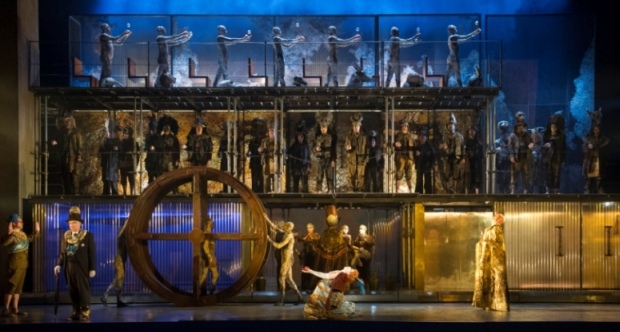
© Robert Workman
That childhood embarrassment has crossed my mind more than once recently with each new pronouncement by English National Opera's inexperienced (or, more accurately, differently skilled) board of management. My, how they're struggling to steer the thing. I bet they want it to stop too, but since they haven't driven anything like an opera company before they don't know how. So they hit the fence.
Every time CEO Cressida Pollock makes a new statement it provokes cynicism on social media, the latest being the accuracy or otherwise of her claim that she and senior management are taking pay cuts. I'm not equipped to add my voice to that imbroglio, although the semblance of spin isn't helped by a generalised tone that’s light on detail and strategy. No, I’m bothered by something else.
The custodians of both ENO and its three most prized possessions, the chorus, the orchestra and Frank Matcham's glorious London Coliseum, are threatening their corner of the nation's heritage by seeking to reduce the size, pay and permanence of one of the very finest opera choruses in the world. It's no exaggeration to describe the ENO Chorus as such: last week it was singled out by the International Opera Awards panel, a recognition that came just hours after its nomination for a 2016 Olivier Award. What more proof do the bean counters need that they're sitting on a crock of gold?
'A world-class resource'
It won't have escaped the board's notice that all three of the company's crown jewels are interlinked. It certainly hasn't escaped mine that their plan to reduce the chorus to an untenable pool of part-timers goes against all logic. If you're in financial trouble and you have a world-class resource on your books, the obvious priority is to squeeze as much benefit from it as you can, not decimate it. Taken together, the ENO Orchestra and Chorus could take the world's concert halls by storm and bring immeasurable kudos to this country. And if that has to be done out of season, at least the company's planned decline to the level of a country house festival (or even less, given that Glyndebourne offers nine or ten operas across the year against ENO's latest reduction to eight) means there'll be plenty of time to do it.
As for the Coliseum itself. ENO's board has been accused by some journalists of conspiring with Arts Council England to make the place uninhabitable for a slimmed down company and then move out, possibly to the historically unloved Roundhouse at Chalk Farm. Indeed a few, Private Eye among others, have gone further by suggesting that the dream plan is to shut down ENO altogether so that ownership of the London Coliseum reverts to the Arts Council, who'll then sell its prime slice of west-end real estate at a vast profit. Such a plan would be despicably cynical if true, not least for being conceived on the sly; but once the ENO board reduces its chorus to the scale of a regional company it will add weight to voices who already say that the place is too big.
The canard about the Coliseum being oversized is preposterous, of course. Anyone who attends regularly will know that while the odd production struggles in it, the vast majority of shows fill it thrillingly. And that's not down to scale nor spectacle, it's about understanding how theatrical spaces actually work. Simon McBurney, who knows a thing or two about such matters, has no trouble weaving stage magic there with Mozart's modest little Singspiel The Magic Flute, and nor does Phelim McDermott, whose extraordinary new Akhnaten embraces the epic. Do go and see these two triumphs if you haven't already done so.

© Richard Hubert Smith
As for the capacity of its auditorium, all ENO has to do is consider which operas are likely to pack 'em in and which will be harder sells, then decide on a show-by-show basis whether or not to open its balcony. Productions can be budgeted accordingly. The London Coliseum is a flexible space and it should be used as such.
Where exactly is Arts Council England in all this? Twelve months ago it showed its displeasure – and its teeth – by removing ENO from the national portfolio until it puts its house in order. Since then things have moved on apace, and very few of the old management guard are still in post, so it will soon be time to ask what sanctions ACE intends imposing on the present board, given its questionable stewardship of a key cultural bastion. Don’t hold your breath, though. There's been a deafening silence from ACE’s chief executive Darren Henley since his Guardian article of 16 February, in which he claimed, unequivocally, "we are fully supportive of [ENO's] new leadership".
No one apart from the odd accountant wants to see ENO crash, least of all me. I love the company, warts and all, and I hope it hires a strategically-minded new artistic leader who'll see growth as the corrective (and correct) way forward – perhaps in directions the less visionary among us cannot imagine. Someone who understands that the company's very name implies a duty to serve both opera and the English nation, who can win ACE's trust and who'll be given time to deliver on it.
Meanwhile, starting tomorrow – today, even – the much-maligned board has a chance to prove its own mettle by pursuing new avenues for income rather than stripping away the company’s lifeblood.
If it doesn’t, I'll be here to say moo.












